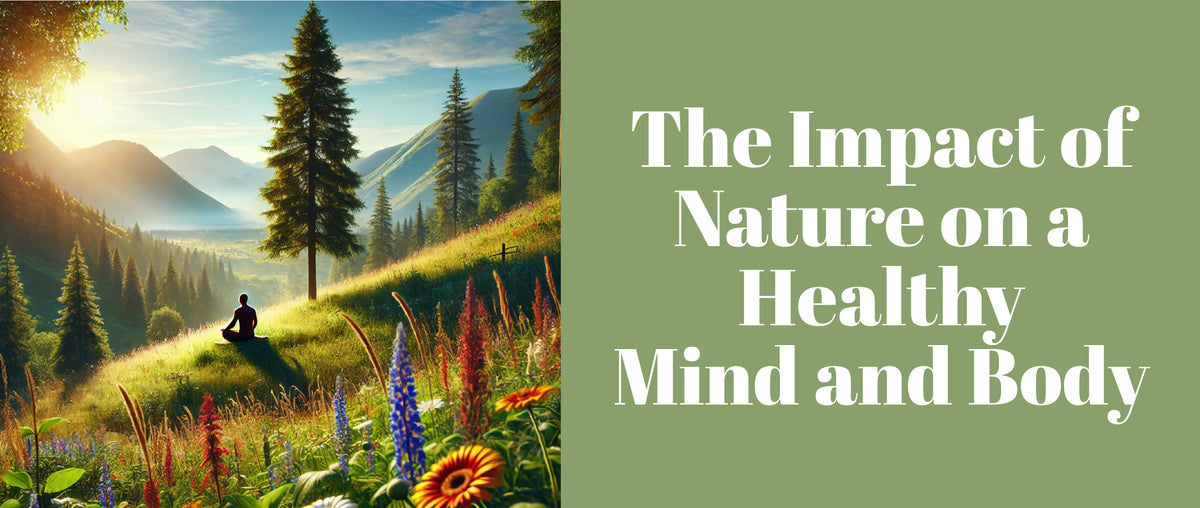The Impact of Nature on a Healthy Mind and Body
In our modern lives, filled with digital distractions and urban stressors, we often overlook one of the simplest remedies for improving mental and physical health: nature. Time spent outdoors has profound effects on both mind and body, offering a refuge from stress, anxiety, and physical ailments. The interaction with the natural world not only helps us feel more connected but also fosters a greater sense of well-being. This article explores the ways in which nature nurtures both mental and physical health, as well as practical tips to integrate more nature into your daily routine.
Key Takeaways
- Nature exposure lowers stress levels, promotes relaxation, and boosts overall mood.
- Regular time outdoors helps improve cognitive function and creativity while reducing symptoms of depression.
- Physical benefits include improved cardiovascular health, lower blood pressure, and a stronger immune system.
- Incorporating vegan products like vegan cheese and vegan butter into a balanced lifestyle can further enhance these positive health outcomes.
- Engaging with unprocessed cheeses and plant-based options like cashew butter supports a sustainable, eco-friendly diet, adding to overall well-being.
The Mental Health Benefits of Being in Nature
Stress Reduction and Anxiety Relief
The mental health benefits of spending time in nature are extensive. Research consistently shows that exposure to green spaces helps lower cortisol levels—the hormone responsible for stress. One study found that individuals who spent time in forest environments showed significant reductions in cortisol compared to those in urban settings.
Spending just 20-30 minutes in nature can lead to measurable improvements in mood, mental clarity, and relaxation.
Moreover, time spent in nature not only helps relieve anxiety but also diminishes feelings of depression. A study by Mind UK, a mental health charity, revealed that individuals who participated in outdoor activities like walking and gardening reported lower levels of depression.
This highlights the idea of ecotherapy, which uses nature as a therapeutic tool to combat anxiety and depression.
The interplay between nature and mental health can be explained through the Biophilia Hypothesis, which suggests that humans have an innate desire to connect with nature. Whether it's a quiet walk through a forest, hiking in the mountains, or simply sitting in a park, nature offers a serene environment that calms the mind.
Connection with Nature and Emotional Well-being
Spending time outdoors can foster a deeper connection with both the self and the environment. Research from the University of Illinois shows that individuals who live near green spaces tend to have stronger social connections and higher levels of community trust. This emotional bond helps create a sense of belonging and unity, reducing feelings of loneliness and isolation.
Additionally, nature has been shown to stimulate parts of the brain associated with empathy and social connection. This is particularly valuable in today’s hyper-connected yet often emotionally isolated world. As we engage with the natural world, our brains experience lower levels of fear and anxiety, allowing for more positive social interactions.

Physical Health Improvements from Nature Exposure
Boosting Immune System Functionality
Beyond the mental health benefits, nature has a profound impact on physical health. The practice of forest bathing, known as Shinrin-yoku in Japan, involves immersing oneself in a forest setting to absorb its therapeutic qualities. Studies show that forest bathing can enhance immune system function by increasing the production of natural killer cells, which are vital in defending the body against viruses and cancer.
Even short-term exposure to green spaces can reduce inflammation, which is often linked to chronic diseases like diabetes and heart disease. Nature offers a natural form of detoxification, clearing the body and mind from the pollutants and stressors of urban life.
Heart Health and Blood Pressure
Time spent outdoors also improves cardiovascular health. Natural environments encourage physical activities such as walking, jogging, or hiking, which improve heart function and reduce blood pressure. According to the American Heart Association, individuals who spend more time in nature have a lower risk of cardiovascular diseases, including stroke.
The physical benefits of spending time outdoors go hand-in-hand with diet and nutrition. A heart-healthy, plant-based diet featuring Unprocessed Cheese, vegan cheese, and vegan butter can further lower cholesterol and blood pressure, complementing the positive effects of nature. Incorporating mozzarella cheese into your meals, particularly plant-based options, ensures that you’re fueling your body with essential nutrients while maintaining a balanced diet.
Nature as a Remedy for Nature Deficit Disorder
Nature Deprivation and Its Consequences
In an era dominated by screens, many individuals—especially children—are suffering from what is now referred to as nature deficit disorder. This term describes the mental and physical consequences of spending too little time outdoors, including higher risks of depression, attention difficulties, and obesity. Excessive screen time is often associated with increased stress levels, social disconnection, and lack of creativity.
The Role of Nature in Cognitive Function
Engaging with nature has been proven to restore cognitive function and enhance focus. Attention Restoration Theory (ART) posits that nature has a restorative effect on mental fatigue, which is especially crucial for those in high-stress environments. After spending time outdoors, individuals report improved concentration, creativity, and decision-making abilities.
Urban dwellers can benefit from seeking out nearby green spaces or even bringing elements of nature indoors, such as houseplants, to create a more tranquil environment. Pairing these efforts with nutritious food choices, like plant based cheese or fat-free butter, supports a holistic approach to wellness.
Ecotherapy: Healing Through Nature
What is Ecotherapy?
Ecotherapy is a growing field of mental health treatment that uses structured outdoor activities to improve well-being. Participants in ecotherapy programs engage in activities such as hiking, gardening, or nature walks, which have been shown to reduce symptoms of anxiety and depression. A study conducted by Mind UK found that 69% of participants in ecotherapy sessions reported improved mood and mental well-being.
Real-life Examples of Ecotherapy
Ecotherapy has been adopted by various mental health organizations to support individuals coping with stress, trauma, and depression. For example, the University of Minnesota offers programs where patients with chronic mental health issues engage in outdoor activities like community gardening or guided nature walks. These programs have proven effective in reducing depressive symptoms and promoting a sense of connection.
Incorporating a healthy, plant-based diet alongside ecotherapy amplifies these benefits. For example, consuming fat-free cheese or plant based butter adds essential nutrients to a diet, supporting both mental and physical health.
Also Read
How to Incorporate Nature into Your Daily Life
Practical Tips for Engaging with Nature
- Daily Walks in Green Spaces: Take 20-30 minutes out of your day to walk in a park or any natural setting. Walking reduces stress and improves your mood, especially if done regularly.
- Outdoor Mindfulness: Combine mindfulness techniques like deep breathing with outdoor activities to enhance your mental clarity and reduce anxiety.
- Bring Nature Indoors: If outdoor time is limited, bring nature indoors with plants or water features, which help create a serene atmosphere at home or in the office.
- Physical Activity: Engage in activities like jogging, cycling, or yoga in outdoor spaces. Physical exercise in nature helps improve heart health and reduces stress levels.
Complementing these practices with a healthy diet can further improve your well-being. Opt for Vegan Cheese, Unsalted Butter, or fat-free butter to create heart-healthy meals that align with an eco-friendly lifestyle.
Conclusion
Nature offers an accessible, cost-free way to enhance both mental and physical health. From reducing stress and anxiety to improving cognitive function and physical fitness, the benefits of spending time outdoors are abundant. By integrating nature into your daily routine, and pairing these habits with a diet rich in Vegan products like vegan butter, plant based cheese , and Cashew Butter, you can achieve holistic health.
Take a step outside today, breathe in the fresh air, and feel the transformative power of nature on your mind and body. Whether you’re hiking in the mountains or simply taking a stroll in your neighborhood park, nature has the ability to nurture and restore.
Do you enjoy vegan food? We have a list of vegan restaurants in India to help you find delicious options in your area!










